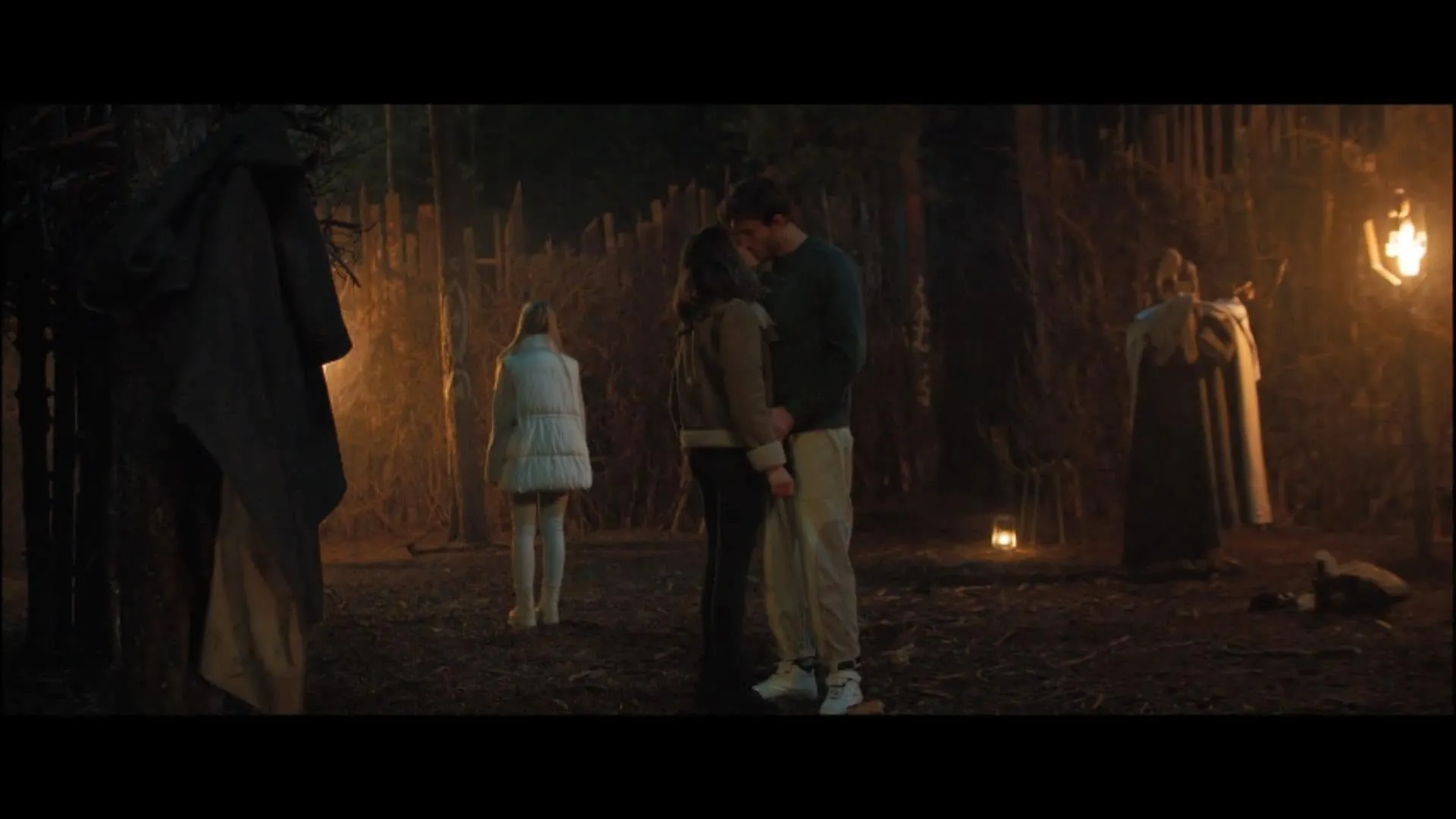Serik Beyeu’s latest film, originally titled Succubus and retitled The Demoness for its home‑video release, debuted in 2024 and landed on digital platforms February 11, 2025 (with Blu‑ray and DVD following May 27). Shot in Russian and presented with an English dub, this supernatural thriller unfolds under the direction of Beyeu, who also oversees a screenplay co‑written by Dmitry Zhigalov and Oleg Kurochkin.
The premise is deceptively simple: an exclusive island retreat invites couples to confront hidden fractures in their relationships through a series of masked ceremonies and guided “truth” exercises. Yet beneath the veneer of therapeutic renewal, an ancient succubus lurks, feeding on guests’ deepest longings and twisting their desires into catastrophic betrayals.
Cinematographer Anton Zenkovich frames the wintry forest and cabin interiors with mirror‑laden compositions, reinforcing the film’s interest in dualities—what we show our partners versus what we conceal. Beyeu alternates between methodical build‑ups in couple dynamics and sudden jolts of erotic violence, aiming to keep viewers off balance. In a world where desire becomes weaponized, can love survive the abyss?
Mapping the Narrative Terrain
From its first frame, Succubus establishes a sterile retreat where masked attendants deliver cryptic instructions via disembodied voices. Couples arrive with personal stakes: Stacy, on a quest to find her missing twin; Michael, the pragmatic IT specialist; Andy and Olivia, nursing wounds from infidelity; and other duos seeking emotional repair. Note‑card “truth” exercises and partner‑swapping rituals set a ritualistic tone, hinting that healing here demands more than simple confession.
Midnight ceremonies trigger the inciting shock: participants vanish without warning, and Stacy uncovers records of her sister’s fate, transforming her role from guest to investigator. This pivot fractures any expectation of a straightforward haunted‑house tale and shifts focus to a personal vendetta woven into the broader horror.
As the plot advances, hallucinations in the tangled woods force characters into unwitting intimacy. Mirrors scattered throughout the retreat reflect distorted desires, underlining how self‑delusion feeds the succubus’s power. One by one, guests succumb—some through lust, others through sheer desperation—while the narrative tightens its grip, tracking each transformation with clinical precision.
The ritual sacrifice builds to a fever pitch. Nino Ninidze’s demoness emerges in full form, her incantations slicing through the hushed cabin corridors. Stacy’s confrontation in a subterranean chamber feels borrowed from classic folklore, yet the introduction of “Babylon’s Water of Death” and improvised Molotov cocktails adds a DIY flair that undercuts genre predictability.
By the final act, escape teeters between deliverance and doom. Stacy’s emotional reckoning—choosing vengeance or mercy—anchors the resolution. Whether she steps into daylight or remains trapped in the island’s shadow, the structure leaves her fate unresolved, reflecting how horror often denies neat closure.
Under the Masks: Character Architectures
From the outset, Stacy occupies the narrative’s emotional center. Angelina Pahomova portrays twin sisters with two distinct impulses: one driven by grief over a vanished sibling, the other by detached curiosity at the island’s secrets. Her performance shifts seamlessly between wary suspicion—eyes narrowing at masked instructions—and raw determination when she uncovers her sister’s trail. There are moments when her fear feels almost clinical, which suits a heroine burdened by personal loss.
Michael arrives as Stacy’s foil. Anton Rival embraces the role of the pragmatic partner who dismisses odd rituals as harmless retreats. Early scenes show him cracking jokes while flipping through informational pamphlets. His transformation—from skeptic rolling his eyes at each “truth” exercise to a believer clutching makeshift weapons—follows a familiar arc. Rival’s grounded delivery helps sell the transition, even if the pacing occasionally stalls during his realization.
Andy and Olivia represent the film’s most explicit subplot. Their unresolved infidelity fuels temptation sequences that veer into soft‑core territory. When they drift toward each other’s partners, the screenplay borders on cartoonish, yet this excess underscores how desire can unravel trust. Other couples, less defined, serve as background studies of thirty‑somethings seeking novelty. These secondary duos never quite break free from cliché, but their brief moments of panic contribute to the mounting dread.
Jean and Javier, the masked retreat masters played by Nino Ninidze and Artur Beschatny, function as ritual gatekeepers. Their stoic presence and rote commands lack emotional warmth, which seems intentional—cult leaders rarely offer comfort. Ninidze’s demoness, in contrast, blends a sultry charisma with predatory hunger. In scenes of transformation, her body language shifts from languid seduction to jolting violence, a contrast that remains one of the film’s more arresting visuals.
Overall, chemistry between leads varies. Pahomova and Rival share credible tension, but many ensemble interactions feel rehearsed rather than lived‑in. The English dub often flattens urgency, muting emotional crescendos. Even so, the presence of extras—particularly in erotic dream sequences—adds an unsettling atmosphere, as if the island itself were conspiring against genuine intimacy.
Direction, Cinematography, and Visual Style
Beyeu approaches the material with a steady hand, alternating moments of slow-burning tension with sudden jolts that feel almost apologetic. He lingers on couples sharing intimate confessions, then interrupts the calm with a burst of erotic violence. It’s as if he wants viewers to question whether desire itself might be the real monster.
Anton Zenkovich’s camerawork anchors this push‑pull. Long takes trace nervous footsteps through tangled pines, allowing unease to mount without a single cut. When characters confront their darkest impulses, mirrors become more than props—they’re portals. Reflections fracture faces in half, suggesting that what we see is only half the story. Interiors, scrubbed clean and antiseptic, stand in stark contrast to the wild forest outside. The result: every doorway feels like a choice between safety and surrender.
Lighting choices reinforce that tension. Daylight scenes carry a bone‑chilling chill—gray skies bleed into pale skin, and breath hangs heavy in the air. In seduction sequences, the palette warms, casting lovers in soft pools of amber glow. Yet darkness returns at every turn, hiding disguised demons in shadows while audiences squint for clues.
Production design leans into ritualistic order. Branches twist into makeshift barriers, their bark curling like watchful fingers. Masked attendants drift between rooms, brandishing note cards scrawled with ominous instructions. The cabin’s décor shifts as the story deepens: cozy furnishings give way to an underground chamber fitted with crude altars and dripping candles. The environment seems to conspire against escape.
Two sequences stand out. The sacrificial rite in the cavern merges ceremony and chaos—robed figures circle a bound victim while the demoness emerges in a swirl of silk and gore. Editing here is surgical: each cut lands like a scalpel. Then there’s the forest fever dream, where rapid cross‑cuts pit lustful hallucinations against panicked flight. Rhythm and pacing feel calibrated to keep viewers off balance, never certain which impulse will seize control next.
Echoes of Desire and Dread
From its first note, Succubus treats desire as a weapon. The titular demon embodies unchecked libido, drawing strength from each whispered confession. Couples’ “truth” exercises—shuffled note cards and masked prompts—begin as therapeutic gimmicks but erode moral boundaries, turning confession into confessionals of betrayal. What starts as vulnerability quickly curdles into a currency the demoness spends in blood.
Mirrors define identity and transformation. Fragmented reflections split faces down the middle, asking whether we recognize ourselves or someone we’ve never met. When the succubus shifts shape, trust fractures as sharply as glass. Each reflection suggests an alternate self waiting to emerge, and the demon’s shapeshifting becomes a cruel commentary on how little we see of those closest to us.
Guilt simmers beneath every betrayal. Andy and Olivia’s infidelity subplot fuels temptation sequences that amplify their shame into horror. They circle new partners as if rehearsing excuses, yet their reluctance to admit wrongdoing seals their fate. In those moments, the film insists that sin doesn’t simply corrupt the soul—it delivers you to the jaws of darkness.
Ritual and spontaneous faith clash. Cult leaders read from yellowed note cards in a voice half‑committed, half‑mimicked—an uncanny echo of ancient chants. When “Babylon’s Water of Death” emerges, it arrives as a half-remembered myth, less a balm than a prop. The film begs the question: is redemption ever more than a story we tell ourselves?
Isolation drives the plot’s machinery. The island functions as a chronotope where outside laws dissolve. Forest pathways weave into a labyrinth of the mind, each fork leading deeper into paranoia. Trees reach like accusatory fingers, trapping characters in a psyche‑scape with no exit sign.
Impact and Resonance
The film’s visual design stakes its claim early, marrying soft‑core intimacy with moments of genuine dread. Textures of frost‑bitten pines and candlelit chambers linger long after the credits roll. Angelina Pahomova commands attention, her twin roles carving out emotional stakes that ground the supernatural excess. The retreat’s mythic layers—ancient chants, masked rituals—imbue the setting with an almost tactile atmosphere, reminding us why location can function as a character in its own right.
Narrative gaps occasionally yawn open, as when characters ignore glaring danger for the sake of another gratuitous seduction. Such choices strain credibility and dilute suspense. The English overdub stumbles over key moments, flattening beats that deserve heft. And while nudity underscores the film’s thematic focus on desire, it sometimes feels deployed as spectacle rather than story‑driven revelation.
This belongs in the hands of those who grew up on 90s erotic thrillers and B‑movie chills—a crowd willing to trade tight plotting for campy flair. Viewers committed to the original Russian track will find emotional currents that the dub can’t quite convey.
A mood piece that seduces more than it fully satisfies. Lean into its excesses—let the ritualistic choreography and whispered incantations carry you—and you’ll appreciate a thriller unafraid to dress horror in silk.
Full Credits
Director: Serik Beyseu
Writers: Oleg Kurochkin, Dmitry Zhigalov
Producers: Aleksandr Denisyuk, Vladimir Denisyuk, Irina Kalinina, Aleksandr Kurinsky, Nikolay Tabashnikov
Executive Producer: Dmitry Sushchenko
Cast: Angelina Pakhomova (Stacey), Viktor Mikhailov (Andy), Polina Davydova (Olivia), Anton Rival (Michael), Paulina Vrublevska (Kate), Pierre Bourel (Nick), Nino Ninidze (Gin), Arthur Beschastny (Javier), Ksenia Pikalova (Elishwa), Vasiliy Evseev (Sukkub)
Director of Photography (Cinematographer): Anton Zenkovich
Editor: Artemy Shevchenko
Composers: Sergey Lebedev, Konstantin Poznekov
The Review
Succubus
Succubus crafts a sensorial feast of erotic horror, anchored by Pahomova’s dual performance and vivid atmosphere, yet undermined by plot inconsistencies and uneven dubbing. It’s a striking curio for fans of B‑movie chills, though those craving narrative precision may feel left wanting.
PROS
- Angelina Pahomova’s compelling twin‑sister performance
- Rich, immersive atmosphere and production design
- Bold fusion of eroticism and horror elements
- Mirror and reflection motifs that reinforce theme
- Forest sequences that build genuine tension
CONS
- Noticeable plot holes and questionable character choices
- Flat, uneven English dubbing undercuts key moments
- Overreliance on nudity with limited narrative purpose




















































